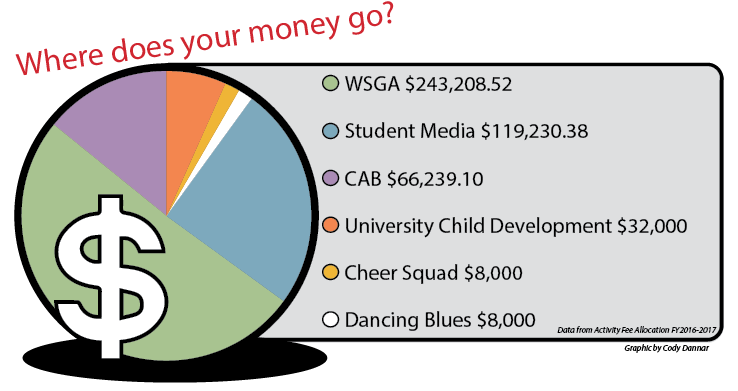WSGA audits student activity fee usage
January 16, 2018
The total amount of student activity fees collected for the 2016-2017 fiscal year was just over $500,000. This amount comes from the student activity fees paid by each degree-seeking Washburn student enrolled in six or more credit hours.
Degree-seeking undergraduates who are enrolled in 12 or more hours pay $55 per semester into the student activity fee fund, while degree seeking undergraduates who are enrolled in six to 11 hours pay $29 per semester into the fund. This fund is broken up among a few major student organizations.
According to the constitution and bylaws of WSGA, an audit of how these funds are being used should occur every year. According to Jessica Barraclough, director of student activities and Greek life and adviser to WSGA, the last time the student fee usage was reviewed and revised was during the 2014-2015 White/McAfee administration.
Zac Surritt, WSGA budget director, along with the WSGA allocations committee, has been conducting interview style audits with the organizations that use student fee money. These organizations include: WSGA, Student Media, Campus Activities Board, University Child Development, Cheer and the Dancing Blues.
Each semester the funds are broken up into two areas, fixed allocations and percentage allocations. For fixed allocations, UCD receives $16,000 per semester or $32,000 annually, cheer and dance each receive $4,000 per semester or $8,000 each annually.
After this money has been allocated, the remaining funds are broken up by percentage and distributed to the remaining organizations.
WSGA receives 58% of the remaining funds- some of which are for student organization funding requests as well as other campus services. Student Media receives 27%, with 16.2% going toward the Washburn Review and 10.8% going toward the Kaw Yearbook and CAB receives 15%.
Surritt says he hopes to form a committee soon with representatives from the organizations that “have a stake” in student activity fee usage to review the findings of the audit. He says that the auditing process helps to bring people together.
“The auditing process kind of links everyone back together and brings everyone to the table in figuring out what our goals are, as not just our own organizations but as a student body,” Surritt said. “In my opinion, Cheer, Dance, CAB, Student Media, UCD and WSGA all have similar interests in that they are in one way or another serving the student body.”
Surritt said there are many safeguards in place to make sure that WSGA fairly audits their own use of student activity fee money.
“It’s always an issue, having the organization that is responsible for divvying up the student activity fee also receiving the student activity fee,” Surritt said.
As budget director, Surritt says he is the caretaker of the money that goes in and out of WSGA, so he keeps both digital and hard copies of all their expenses which then have to be approved by Barraclough. Additionally, the allocations committee as a whole is the responsible party for conducting the audits which Surritt says helps with accountability.
According to Barraclough, most schools have a much higher student activity fee because it covers things like student health services and student recreation facilities.
“Washburn believes that you are coming to school and your tuition dollars should be for those things [recreation, health, and counseling services] because they are basic needs versus having to pay extra,” Barraclough said.
If the findings of the audit reveal a need for an increase in the student activity fee, the allocations committee would have to draft a proposal. The proposal would have to go through their adviser, the VP of student life, the executive staff and finally the board of regents.



